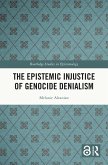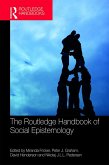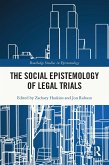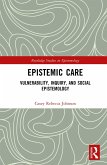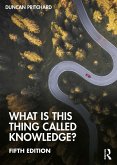Philosophy, Expertise, and the Myth of Neutrality (eBook, PDF)
Redaktion: Farina, Mirko; Lavazza, Andrea
42,95 €
42,95 €
inkl. MwSt.
Sofort per Download lieferbar

21 °P sammeln
42,95 €
Als Download kaufen

42,95 €
inkl. MwSt.
Sofort per Download lieferbar

21 °P sammeln
Jetzt verschenken
Alle Infos zum eBook verschenken
42,95 €
inkl. MwSt.
Sofort per Download lieferbar
Alle Infos zum eBook verschenken

21 °P sammeln
Philosophy, Expertise, and the Myth of Neutrality (eBook, PDF)
Redaktion: Farina, Mirko; Lavazza, Andrea
- Format: PDF
- Merkliste
- Auf die Merkliste
- Bewerten Bewerten
- Teilen
- Produkt teilen
- Produkterinnerung
- Produkterinnerung

Bitte loggen Sie sich zunächst in Ihr Kundenkonto ein oder registrieren Sie sich bei
bücher.de, um das eBook-Abo tolino select nutzen zu können.
Hier können Sie sich einloggen
Hier können Sie sich einloggen
Sie sind bereits eingeloggt. Klicken Sie auf 2. tolino select Abo, um fortzufahren.

Bitte loggen Sie sich zunächst in Ihr Kundenkonto ein oder registrieren Sie sich bei bücher.de, um das eBook-Abo tolino select nutzen zu können.
This volume offers a new framework for understanding expertise. It proposes a reconceptualization of the traditional notion of expertise and calls for the development of a new contextual and action-oriented notion of expertise, which is attentive to axiological values, intellectual virtues, and moral qualities.
- Geräte: PC
- mit Kopierschutz
- eBook Hilfe
Andere Kunden interessierten sich auch für
![Philosophy, Expertise, and the Myth of Neutrality (eBook, ePUB) Philosophy, Expertise, and the Myth of Neutrality (eBook, ePUB)]() Philosophy, Expertise, and the Myth of Neutrality (eBook, ePUB)42,95 €
Philosophy, Expertise, and the Myth of Neutrality (eBook, ePUB)42,95 €![The Epistemic Injustice of Genocide Denialism (eBook, PDF) The Epistemic Injustice of Genocide Denialism (eBook, PDF)]() Melanie AltanianThe Epistemic Injustice of Genocide Denialism (eBook, PDF)0,00 €
Melanie AltanianThe Epistemic Injustice of Genocide Denialism (eBook, PDF)0,00 €![Testimonial Injustice and Trust (eBook, PDF) Testimonial Injustice and Trust (eBook, PDF)]() Testimonial Injustice and Trust (eBook, PDF)52,95 €
Testimonial Injustice and Trust (eBook, PDF)52,95 €![The Routledge Handbook of Social Epistemology (eBook, PDF) The Routledge Handbook of Social Epistemology (eBook, PDF)]() The Routledge Handbook of Social Epistemology (eBook, PDF)46,95 €
The Routledge Handbook of Social Epistemology (eBook, PDF)46,95 €![The Social Epistemology of Legal Trials (eBook, PDF) The Social Epistemology of Legal Trials (eBook, PDF)]() The Social Epistemology of Legal Trials (eBook, PDF)42,95 €
The Social Epistemology of Legal Trials (eBook, PDF)42,95 €![Epistemic Care (eBook, PDF) Epistemic Care (eBook, PDF)]() Casey Rebecca JohnsonEpistemic Care (eBook, PDF)42,95 €
Casey Rebecca JohnsonEpistemic Care (eBook, PDF)42,95 €![What is this thing called Knowledge? (eBook, PDF) What is this thing called Knowledge? (eBook, PDF)]() Duncan PritchardWhat is this thing called Knowledge? (eBook, PDF)37,95 €
Duncan PritchardWhat is this thing called Knowledge? (eBook, PDF)37,95 €-
-
-
This volume offers a new framework for understanding expertise. It proposes a reconceptualization of the traditional notion of expertise and calls for the development of a new contextual and action-oriented notion of expertise, which is attentive to axiological values, intellectual virtues, and moral qualities.
Dieser Download kann aus rechtlichen Gründen nur mit Rechnungsadresse in A, B, BG, CY, CZ, D, DK, EW, E, FIN, F, GR, HR, H, IRL, I, LT, L, LR, M, NL, PL, P, R, S, SLO, SK ausgeliefert werden.
Produktdetails
- Produktdetails
- Verlag: Taylor & Francis eBooks
- Seitenzahl: 328
- Erscheinungstermin: 29. März 2024
- Englisch
- ISBN-13: 9781040003237
- Artikelnr.: 70019318
- Verlag: Taylor & Francis eBooks
- Seitenzahl: 328
- Erscheinungstermin: 29. März 2024
- Englisch
- ISBN-13: 9781040003237
- Artikelnr.: 70019318
- Herstellerkennzeichnung Die Herstellerinformationen sind derzeit nicht verfügbar.
Mirko Farina is Professor and Head of the Human Machine Interaction Lab (HMI Lab) in the Institute for Digital Economy and Artificial Systems (IDEAS), a joint collaboration between Xiamen University (XMU) and Lomonosov Moscow State University (MSU). Prior to that he was Associate Professor of Philosophy at Innopolis University. Andrea Lavazza is a moral philosopher and a neuroethicist. He is Senior Research Fellow at the Centro Universitario Internazionale, Arezzo, Italy, and Adjunct Professor in Neuroethics at the University of Milan and at the University of Pavia, Italy. His main interests are at the intersection of ethics, epistemology, and cognitive science.
Introduction: Gripping with the myth of neutrality Mirko Farina and Andrea Lavazza Part 1: Defining Expertise 1. Trustworthy experts and untrustworthy experts: Insights from the cognitive psychology of expertise Andrew J. Waters and Fernand Gobet 2. Covid-19 and denialism: A primer on cognitive psychology for science communicators and policymakers Andrea Lavazza and Mirko Farina 3. Do we still need experts? Nick Brancazio and Neil Levy 4. Hypocritical experts Duncan Pritchard 5. The epistemic authority of practice Dylan Mirek Popowicz Part 2: Expertise in Action 6. Reimagining expertise and neutrality toward epistemic justice in research, clinical translation, and policy: A perspective from neuroethics Anna Nuechterlein, Quinn Boyle, and Judy Illes 7. Expertise in action: Insights from Naturalistic Decision Making (NDM) Olivia Brown, Nicola Power, Neil Shortland, and Julie Gore 8. What the pandemic showed us about reason and values Ulrike Hahn and Stephan Lewandowsky 9. The priests of the biomedical religion: Against a flawed understanding of experts Ralf J. Jox 10. Scarce resource allocation during infectious disease outbreaks: A communitarian perspective Xiaozheng Yang and Yali Cong Part 3: Expertise and its Values in the New World 11. Legal expertise and its subject matter within common law adjudication John Coggon 12. The revolution of (neuroscience) experts in the courtroom? Ilaria Zampieri, Matteo Pirisi, and Pietro Pietrini 13. When the politics of contextuality (can) subvert science: A case study of Australian women's perceptions of alcohol consumption and breast cancer risk Kristen Foley, Belinda Lunnay, and Paul R. Ward 14. The post-truth challenge to expertise Douglas V. Porpora 15. Expertise for a New World: Is bioarchaeology fit for purpose? Charlotte A. Roberts
Introduction: Gripping with the myth of neutrality Mirko Farina and Andrea Lavazza Part 1: Defining Expertise 1. Trustworthy experts and untrustworthy experts: Insights from the cognitive psychology of expertise Andrew J. Waters and Fernand Gobet 2. Covid-19 and denialism: A primer on cognitive psychology for science communicators and policymakers Andrea Lavazza and Mirko Farina 3. Do we still need experts? Nick Brancazio and Neil Levy 4. Hypocritical experts Duncan Pritchard 5. The epistemic authority of practice Dylan Mirek Popowicz Part 2: Expertise in Action 6. Reimagining expertise and neutrality toward epistemic justice in research, clinical translation, and policy: A perspective from neuroethics Anna Nuechterlein, Quinn Boyle, and Judy Illes 7. Expertise in action: Insights from Naturalistic Decision Making (NDM) Olivia Brown, Nicola Power, Neil Shortland, and Julie Gore 8. What the pandemic showed us about reason and values Ulrike Hahn and Stephan Lewandowsky 9. The priests of the biomedical religion: Against a flawed understanding of experts Ralf J. Jox 10. Scarce resource allocation during infectious disease outbreaks: A communitarian perspective Xiaozheng Yang and Yali Cong Part 3: Expertise and its Values in the New World 11. Legal expertise and its subject matter within common law adjudication John Coggon 12. The revolution of (neuroscience) experts in the courtroom? Ilaria Zampieri, Matteo Pirisi, and Pietro Pietrini 13. When the politics of contextuality (can) subvert science: A case study of Australian women's perceptions of alcohol consumption and breast cancer risk Kristen Foley, Belinda Lunnay, and Paul R. Ward 14. The post-truth challenge to expertise Douglas V. Porpora 15. Expertise for a New World: Is bioarchaeology fit for purpose? Charlotte A. Roberts


